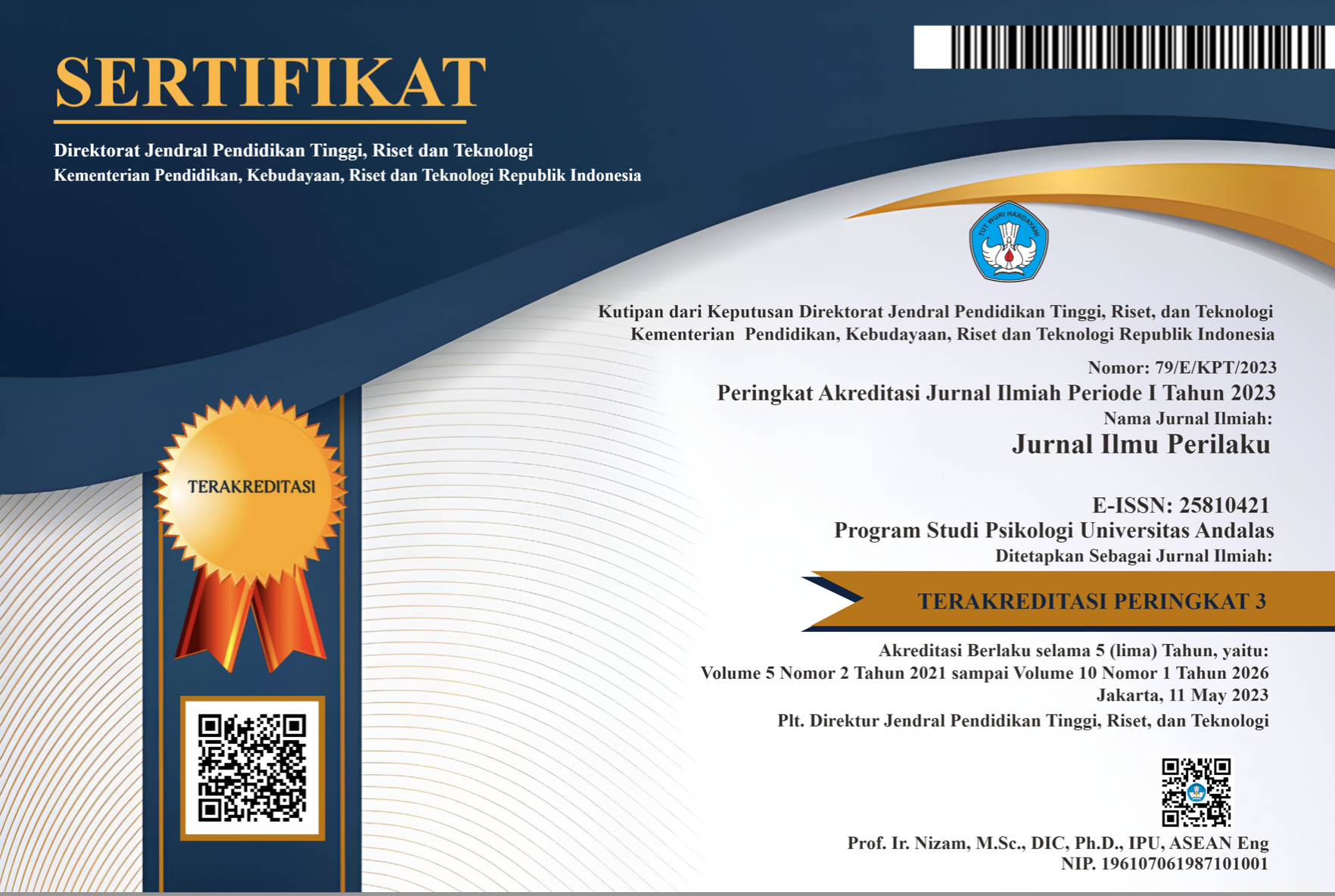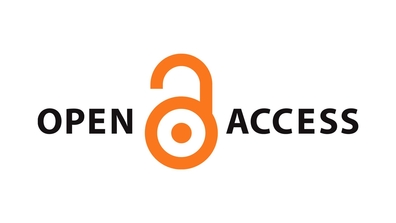The Role of Psychological Empowerment in Mediating the Relationships between Flexible Working Arrangements and Innovative Work Behavior
Abstract
In today's dynamic work environment, the rise of flexible working arrangements and psychological empowerment has sparked a keen fascination with exploring how these new approaches drive employee innovation. This study examines the role of psychological empowerment in mediating the relationship between flexible work arrangements and innovative work behavior. A quantitative approach was used with a cross-functional method. A total of 255 employees in Indonesia took part in the research by filling in instruments via Google Forms. The convenience sampling technique was implemented in this study, focusing on those with at least one year of experience in organizations with hybrid or flexible work designs. Data were analysed using SMART PLS 4.0. The results showed that psychological empowerment fully mediated the relationship between flexible work arrangements and innovative work behavior. These findings suggest that organizations should focus on designing flexible work arrangements that encourage psychological empowerment in individuals, which may ultimately lead to increased innovative work behavior.
Downloads
References
Albion, M. J. (2004). A Measure of Attitudes Towards Flexible Work Options. Australian Journal of Management, 29(2), 275–294. https://doi.org/10.1177/031289620402900207
AlEssa, H. S., & Durugbo, C. M. (2022). A systematic review of innovative work behavior concepts and contributions. Management Review Quarterly, 72(4), 1171–1208. https://doi.org/10.1007/s11301-021-00224-x
Ariffin, D. N., Abdullah Bandar, N. F., Sabil, S., Jayos, S., Amaran, M. A., & Hamdan, R. (2016). The Relationship between Flexible Working Arrangements and Quality of Work Life among Academicians in a Selected Public Institution of Higher Learning in Kuching, Sarawak, Malaysia. Journal of Cognitive Sciences and Human Development, 1(2), 46–55. https://doi.org/10.33736/jcshd.197.2016
Armelia, R., & Sjabadhyni, B. (2012). Hubungan antara Psychological Capital dan Psychological Empowerment pada Perawat [Thesis, Universitas Indonesia]. https://lib.ui.ac.id/detail.jsp?id=20313308
Astra wins two accolades at the Asian Technology Excellence Awards. (2023, November 29) Asian Business Review. https://asianbusinessreview.com/event-news/astra-wins-2-accolades-asian-technology-excellence-awards
Aziz-Ur-Rehman, M., & Siddiqui, D. A. (2019). Relationship between Flexible Working Arrangements and Job Satisfaction Mediated by Work-Life Balance: Evidence from Public Sector Universities Employees of Pakistan. SSRN Electronic Journal. https://doi.org/10.2139/ssrn.3510918
Bersin, J., Geller, J., Wakefield, N., & Walsh, B. (2016). Global Human Capital Trends 2016 The New Organization: Different by Design. https://www2.deloitte.com/content/dam/Deloitte/global/Documents/HumanCapital/gx-dup-global-human-capital-trends-2016.pdf
Bhatti, S. H., Vorobyev, D., Zakariya, R., & Christofi, M. (2021). Social capital, knowledge sharing, work meaningfulness, and creativity: evidence from the Pakistani pharmaceutical industry. Journal of Intellectual Capital, 22(2), 243–259. https://doi.org/10.1108/JIC-02-2020-0065
Birkinshaw, J., & Gibson, C. B. (2004). Building an Ambidextrous Organisation. In SSRN Electronic Journal. Elsevier BV. https://doi.org/10.2139/ssrn.1306922
Boon, C., & Biron, M. (2016). Temporal issues in person–organization fit, person-job fit and turnover: The role of leader-member exchange. Human Relations, 69(12), 2177–2200. https://doi.org/10.1177/0018726716636945
Chang, H., Chi, N., & Chuang, A. (2010). Exploring the Moderating Roles of Perceived Person–Job Fit and Person–Organisation Fit on the Relationship between Training Investment and Knowledge Workers’ Turnover Intentions. Applied Psychology, 59(4), 566–593. https://doi.org/10.1111/j.1464-0597.2009.00412.x
Chen, Y., & Fulmer, I. S. (2018). Fine‐tuning what we know about employees’ experience with flexible work arrangements and their job attitudes. Human Resource Management, 57(1), 381–395. https://doi.org/10.1002/hrm.21849
Chin, W. W. (1998). The Partial Least Squares Approach to Structural Equation Modeling. In Modern Methods for Business Research (pp. 295–336).
Conger, J., & Kanungo, R. (1998). Charismatic Leadership in Organizations. SAGE Publications, Inc. https://doi.org/10.4135/9781452204932
Cummings, T. G., & Worley, C. G. (2014). Organization Development and Change (10th ed.). Cengage Learning.
Deloitte. (2019). Deloitte Indonesia Perspectives. https://www2.deloitte.com/content/dam/Deloitte/id/Documents/about-deloitte/id-about-dip-edition-1-full-en-sep2019.pdf
Dutta, S., Lanvin, B., Rivera León, L., & Wunsch-Vincent, S. (Eds.). (2023). Global Innovation Index 2023: Innovation in the face of uncertainty. WIPO.
Estanio, M., Losbanes, M. G., Vigonte, F., & Abante, M. V. (2023). Flexible Work Arrangement: Its Significance to Employees’ Performance and Productivity. In SSRN Electronic Journal. Elsevier BV. https://doi.org/10.2139/ssrn.4602059
Etikariena, A., & Muluk, H. (2014). Correlation between Organizational Memory and Innovative Work Behavior. Makara Human Behavior Studies in Asia, 18(2), 77. https://doi.org/10.7454/mssh.v18i2.3463
Ghozali, I., & Latan, H. (2015). Partial Least Squares : Konsep, Teknik dan Aplikasi Menggunakan Program SmartPLS 3.0 (2nd ed.). Badan Penerbit Undip.
Gultom, S., Endriani, D., & Harahap, A. S. (2022). Less Emotion but More Fatigue: Social-Emotional Learning (SEL) Competencies, and Compassion Fatigue among Educators during the COVID-19 Pandemic. Kinestetik : Jurnal Ilmiah Pendidikan Jasmani, 6(1), 146–158. https://doi.org/10.33369/jk.v6i1.21034
Hadras, M. (2023). Mengubah Strategi: Mengikuti Pola Era Tuna Setelah Era Vuca. In Buletin Kolokium Psikologi Ilmiah Nusantara.
Hair, J. F., Page, M., & Brunsveld, N. (2019). Essentials of Business Research Methods. Routledge. https://doi.org/10.4324/9780429203374
Ham, P. M., & Etikariena, A. (2021). Karyawan inovatif menghadapi COVID-19: Bagaimana peran pengaturan kerja fleksibel, beban kerja, dan keterikatan kerja? Jurnal Psikologi Ulayat. https://doi.org/10.24854/jpu204
Hartem, J., & Adkins, A. (2015, April 2). What Great Managers Do to Engage Employees. Harvard Business Review.
Hidayat, A. R. T., & Asmara, A. Y. (2017). Creative industry in supporting economic growth in Indonesia: Perspective of regional innovation system. IOP Conference Series: Earth and Environmental Science, 70, 012031. https://doi.org/10.1088/1755-1315/70/1/012031
Indrayanti, I. (2019). Human Resource Management Content and Process on Employee Well-Being and Job Performance: A Study in Indonesia Public Sector [Dissertation, Nottingham Trent University]. https://www.proquest.com/openview/5014c6d5f3d6104b8f08b43b7387c519/1?pq-origsite=gscholar&cbl=51922&diss=y
Indrayanti, I., & Ulfia, N. (2022). Authentic leadership and innovative work behavior through organizational culture: A study in Indonesian state-owned enterprises. F1000Research, 11, 1243. https://doi.org/10.12688/f1000research.126559.1
International Labour Organization. (2019). World Employment and Social Outlook: Trends 2019. https://www.ilo.org/global/research/global-reports/weso/2019/WCMS_670542/lang--en/index.htm
Janssen, O. (2000). Job demands, perceptions of effort‐reward fairness and innovative work behaviour. Journal of Occupational and Organizational Psychology, 73(3), 287–302. https://doi.org/10.1348/096317900167038
Jiang, L., Pan, Z., Luo, Y., Guo, Z., & Kou, D. (2023). More flexible and more innovative: The impact of flexible work arrangements on the innovation behavior of knowledge employees. Frontiers in Psychology, 14. https://doi.org/10.3389/fpsyg.2023.1053242
Jooss, S., McDonnell, A., & Conroy, K. (2021). Flexible global working arrangements: An integrative review and future research agenda. Human Resource Management Review, 31(4), 100780. https://doi.org/10.1016/j.hrmr.2020.100780
Kinicki, A. (2021). Organizational Behavior: A Practical, Problem-Solving Approach (3rd ed.). McGraw Hill.
Kossek, E. E., Gettings, P., & Misra, K. (2021). The future of flexibility at work. Harvard Business Review, 28.
Ma, E., Zhang, Y., Xu, F. Z., Wang, D., & Kim, M. (Sunny). (2021). Feeling empowered and doing good? A psychological mechanism of empowerment, self-esteem, perceived trust, and OCBs. Tourism Management, 87, 104356. https://doi.org/10.1016/j.tourman.2021.104356
Malik, M., Sarwar, S., & Orr, S. (2021). Agile practices and performance: Examining the role of psychological empowerment. International Journal of Project Management, 39(1), 10–20. https://doi.org/10.1016/j.ijproman.2020.09.002
Maloky, D. M., & Indrayanti, I. (2023). Peran Leader-Member Exchange terhadap Perilaku Kerja Inovatif Dimediatori oleh Psychological Empowerment [Thesis]. Universitas Gadjah Mada.
McGee, B. L., Couillou, R. J., & Maalt, K. (2023). Work from Home: Lessons Learned and Implications for Post-pandemic Workspaces. Interiority, 6(1), 91-114.
Mustangimah, M., Putera, P. B., Zulhamdani, M., Handoyo, S., & Rahayu, S. (2021). Evaluation of the Indonesia national strategic policy of science and technology development. Journal of Science and Technology Policy Management, 12(3), 421–442. https://doi.org/10.1108/JSTPM-04-2020-0079
Ochoa Pacheco, P., & Coello-Montecel, D. (2023). Does psychological empowerment mediate the relationship between digital competencies and job performance? Computers in Human Behavior, 140, 107575. https://doi.org/10.1016/j.chb.2022.107575
Parker, S. K., Williams, H. M., & Turner, N. (2006). Modeling the antecedents of proactive behavior at work. Journal of Applied Psychology, 91(3), 636–652. https://doi.org/10.1037/0021-9010.91.3.636
PWC. (2023). What Indonesians think about work today? PricewaterhouseCoopers. https://www.pwc.com/id/en/pwc-publications/services-publications/consulting/what-indonesians-think-about-work-today.html
Robbins, S. P., & Judge, T. A. (2018). Organizational Behavior (18th ed.). London: Pearson Education.
Roberto, R., Penna, M., Felici, B., & Rao, M. (2023). Smart working and flexible work arrangements: opportunities and risks for sustainable communities. In Intelligent Environments (pp. 243–283). Elsevier. https://doi.org/10.1016/B978-0-12-820247-0.00001-1
Rondi, E., Überbacher, R., von Schlenk-Barnsdorf, L., De Massis, A., & Hülsbeck, M. (2022). One for all, all for one: A mutual gains perspective on HRM and innovation management practices in family firms. Journal of Family Business Strategy, 13(2), 100394. https://doi.org/10.1016/j.jfbs.2020.100394
Shiri, R., Turunen, J., Kausto, J., Leino-Arjas, P., Varje, P., Väänänen, A., & Ervasti, J. (2022). The Effect of Employee-Oriented Flexible Work on Mental Health: A Systematic Review. Healthcare (Basel, Switzerland), 10(5), 883. https://doi.org/10.3390/healthcare10050883
Spreitzer, G. M. (1995). Psychological Empowerment in the Workplace: Dimensions, Measurement, and Validation. Academy of Management Journal, 38(5), 1442–1465. https://doi.org/10.2307/256865
Taibah, D., & Ho, T. C. F. (2023). The Moderating Effect of Flexible Work Option on Structural Empowerment and Generation Z Contextual Performance. Behavioral Sciences, 13(3), 266. https://doi.org/10.3390/bs13030266
Telkom. (2023). BATIC 2023: “Unleashing the Innovation Wave, Enabling a Digital Tomorrow.” Telkom Indonesia. https://www.telkom.co.id/sites/about-telkom/id_ID/news/batic-2023-“unleashing-the-innovation-wave-enabling-a-digital-tomorrow”-2099
World Intellectual Property Organization. (2020). World Intellectual Property Indicators 2020. https://www.wipo.int/edocs/pubdocs/en/wipo_pub_941_2020.pdf
Yasir, N., Babar, M., Mehmood, H. S., Xie, R., & Guo, G. (2023). The Environmental Values Play a Role in the Development of Green Entrepreneurship to Achieve Sustainable Entrepreneurial Intention. Sustainability, 15(8), 6451. https://doi.org/10.3390/su15086451
Yunus, S., & Mostafa, A. M. S. (2022). Flexible working practices and job-related anxiety: Examining the roles of trust in management and job autonomy. Economic and Industrial Democracy, 43(3), 1340-1368. https://doi.org/10.1177/0143831X21995259
Zaza, S., Bartelt, V., Erskine, M., & Armstrong, D. (2023). Mental Health and Information Technology Catalysts as Determinants of Innovative Work Behavior. Communications of the Association for Information Systems, 52(1), 103–131. https://doi.org/10.17705/1CAIS.05205
Zerhouni, L. (2022). Effect of Flexible Work Arrangements on Employees’ Well-being, Job Satisfaction, and Work Performance in Morocco: A Case Study. MAS Journal of Applied Sciences, 7(2), 380–388. https://doi.org/10.52520/masjaps.v7i2id190
The non-commercial use of the article is governed by the Creative Commons Attribution license as currently displayed on Creative Commons Attribution-NonCommercial-ShareAlike 4.0 International License.
JIP's spirit is to disseminate articles published are as free as possible. Under the Creative Commons license, JIP permits users to copy, distribute, display, and perform the work for non-commercial purposes only. Users will also need to attribute authors and JIP on distributing works in the journal.
Please find the rights and licenses in Jurnal Ilmu Perilaku (JIP).
- License
The non-commercial use of the article will be governed by the Creative Commons Attribution license as currently displayed on Creative Commons Attribution-NonCommercial-ShareAlike 4.0 International License.
- Author’s Warranties
The author warrants that the article is original, written by stated author(s), has not been published before, contains no unlawful statements, does not infringe the rights of others, is subject to copyright that is vested exclusively in the author and free of any third party rights, and that any necessary written permissions to quote from other sources have been obtained by the author(s).
- User Rights
JIP's spirit is to disseminate articles published are as free as possible. Under the Creative Commons license, JIP permits users to copy, distribute, display, and perform the work for non-commercial purposes only. Users will also need to attribute authors and JIP on distributing works in the journal.
- Rights of Authors
Authors retain the following rights:
- Copyright, and other proprietary rights relating to the article, such as patent rights,
- The right to use the substance of the article in future own works, including lectures and books,
- The right to reproduce the article for own purposes, provided the copies are not offered for sale,
- The right to self-archive the article.
- Co-Authorship
If the article was jointly prepared by other authors, the signatory of this form warrants that he/she has been authorized by all co-authors to sign this agreement on their behalf, and agrees to inform his/her co-authors of the terms of this agreement.
- Termination
This agreement can be terminated by the author or JIP upon two months’ notice where the other party has materially breached this agreement and failed to remedy such breach within a month of being given the terminating party’s notice requesting such breach to be remedied. No breach or violation of this agreement will cause this agreement or any license granted in it to terminate automatically or affect the definition of JIP.
- Royalties
This agreement entitles the author to no royalties or other fees. To such extent as legally permissible, the author waives his or her right to collect royalties relative to the article in respect of any use of the article by JIP or its sublicensee.
- Miscellaneous
JIP will publish the article (or have it published) in the journal if the article’s editorial process is successfully completed and JIP or its sublicensee has become obligated to have the article published. JIP may conform the article to a style of punctuation, spelling, capitalization, referencing and usage that it deems appropriate. The author acknowledges that the article may be published so that it will be publicly accessible and such access will be free of charge for the readers.










